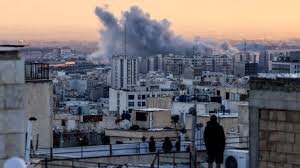Sheikh Ramzan
At a time when aggressive rhetoric is overtaking rational discourse in South Asia, particularly from New Delhi, there is an urgent need to pause, reassess, and give diplomacy a fighting chance. Escalatory language, unsubstantiated allegations, and militaristic posturing between two nuclear-armed neighbors do not just threaten bilateral peace — they imperil the entire region.
Earlier this week, Pakistan’s federal information minister raised alarm by suggesting that India may be planning a provocation “within a day or two.” This followed a similar warning from Deputy Prime Minister Ishaq Dar in the Senate, who cautioned that New Delhi was preparing “some form of escalation.” These are not random comments made in isolation — they are rooted in a series of military and diplomatic developments that point toward growing volatility.
Indian Prime Minister Narendra Modi has reportedly given “operational freedom” to his military, a euphemism that could open the door to cross-border adventurism. In an already charged atmosphere following the tragic incident in Pahalgam, such decisions raise serious concerns. Over the past several days, there have been multiple reports of crossfire along the Line of Control (LoC), Pakistani forces have downed two Indian surveillance quadcopters in Azad Jammu and Kashmir, and PAF jets were scrambled to intercept Indian aircraft patrolling near the LoC. All these incidents suggest a rapidly deteriorating security situation.
The response from Islamabad has been clear and measured. Deputy PM Dar, joined by military and foreign office officials, reiterated Pakistan’s stance: if provoked, the country will respond — but not initiate — conflict. This is a responsible position that seeks to de-escalate while maintaining the right to self-defense. But it must be matched with equally mature behavior from New Delhi.
The current crisis is a textbook example of how misinformation and political opportunism can push a region to the brink. Indian authorities and sections of the country’s hyper-nationalist media continue to link Pakistan to the Pahalgam tragedy without presenting any credible evidence. If such evidence exists, it should be made public — not used as a justification for hostile actions or to inflame public sentiment.
India’s refusal to allow an impartial third-party investigation further undermines its claims. If New Delhi genuinely believes in its accusations, it should welcome independent verification. Instead, what we are witnessing is a media-driven narrative designed to deflect domestic frustrations and whip up nationalist fervor ahead of elections. This cynical use of international crises for political gains is not new — but in a nuclear neighborhood, it is profoundly reckless.
Please subscribe to the YouTube channel of republicpolicy.com for quality podcasts:
History has repeatedly shown that brinkmanship between India and Pakistan can spiral out of control. From Kargil to Balakot, military escalations have always risked wider conflict, with dire humanitarian and economic consequences. There are no winners in war — especially not when two nations possess nuclear capabilities and share a long, contested border.
Recognizing the gravity of the situation, the United Nations has offered to mediate and help prevent further escalation. Pakistan has historically welcomed such interventions; it is time for India to do the same. Dialogue facilitated by neutral international actors could serve as a face-saving off-ramp for both sides and help prevent a dangerous miscalculation.
Key global players — including the United States, Gulf countries, China, and Russia — must also step up. They have vested interests in regional stability, economic partnerships, and counterterrorism efforts. The US Secretary of State’s recent call to Prime Minister Shehbaz Sharif is a positive sign, but diplomacy must be sustained and supported by broader international pressure to pull both countries back from the edge.
The international community should not ignore the possibility that current tensions could erupt into a full-blown crisis. As the window for peaceful resolution narrows, global diplomacy must act with urgency, not caution.
Nearly eight decades of hostility between India and Pakistan have produced little except mutual suspicion, missed opportunities, and countless lives lost. While tensions ebb and flow, the underlying issues — especially Kashmir — remain unresolved. If India is genuinely committed to long-term peace, it cannot continue to stonewall dialogue.
Pakistan has consistently emphasized its willingness to engage in meaningful talks, including on Kashmir. But peace talks must be grounded in sincerity, not superficial optics. India must stop viewing diplomacy as a concession and start recognizing it as a strategic tool for sustainable stability. It must also tone down its belligerent posture and foster an environment conducive to negotiation, not confrontation.
Prime Minister Modi’s administration, particularly under the BJP, has displayed little appetite for real engagement. It has instead preferred to project military strength and nationalist rhetoric, often at the cost of regional harmony. But the longer New Delhi maintains this posture, the more it risks pushing the region toward a catastrophic conflict that will leave both nations worse off.
The subcontinent is no stranger to political tensions and military standoffs. But in today’s interconnected world — with shared environmental, economic, and security challenges — conflict is the least viable path forward. Both nations face deep internal issues: economic uncertainty, social polarization, and climate vulnerability. Engaging in war, or even the threat of it, will only exacerbate these problems.
Pakistan has taken a prudent approach by urging calm and calling for evidence-based dialogue. It is a signal of maturity and strength, not weakness. India should take note and respond in kind. Escalatory rhetoric may serve short-term political goals, but it undermines long-term regional stability.
It is vital that both nations uphold their responsibilities as nuclear powers. A single misstep could trigger consequences far beyond their borders. The stakes are too high for reckless nationalism or political point-scoring.
The current trajectory is deeply worrying, but it is not irreversible. Sanity must be allowed to break through the noise. Instead of indulging in provocations, both India and Pakistan must recommit to diplomacy, transparency, and mutual respect.
India must stop manufacturing crises to serve domestic political agendas. It must stop denying the legitimacy of dialogue. And it must abandon the illusion that military superiority guarantees security. True security lies in peace — in economic cooperation, cultural exchange, and mutual understanding.
Pakistan, for its part, must continue advocating for peaceful resolution, but also stand firm in defending its sovereignty and national dignity.
On the precipice of potential conflict, the subcontinent needs leaders, not loudspeakers. It needs diplomacy, not division. The time to act is now — before the window for peace closes completely.















